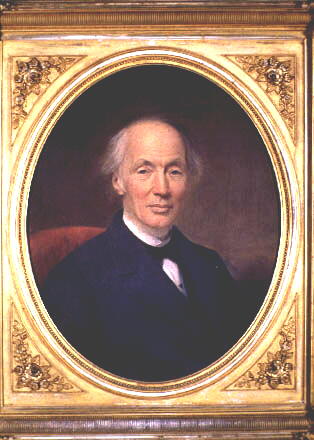 Robert
Dale Owen, the son of
Robert
Owen, was born in Glasgow, Scotland, on 9th November, 1801. Robert Dale Owen was the eldest son of
British social reformer Robert Owen. In 1825, both moved to New Harmony,
Indiana, where the son soon became editor of the town's first newspaper,
the New Harmony Gazette. Robert
Dale Owen, the son of
Robert
Owen, was born in Glasgow, Scotland, on 9th November, 1801. Robert Dale Owen was the eldest son of
British social reformer Robert Owen. In 1825, both moved to New Harmony,
Indiana, where the son soon became editor of the town's first newspaper,
the New Harmony Gazette.
Robert Owen had purchased the town in order
to establish a community based on his principles of social reform. By
1827, the community had lapsed into individualism, the father had returned
to England, and the son had begun working closely with social reformer
Frances Wright. Together they traveled to her experimental community at
Nashoba, Tennessee, then Europe, and then to New York, where he became
editor of the radical free thought newspaper, Free Enquirer.
By 1833, the free thought movement had waned,
and R. D. Owen moved back to New Harmony. He served in the Indiana
legislature (1836-38) and U. S. House of Representatives (1843-47), where
he introduced the bill establishing the Smithsonian Institution. Owen
served as chairman of the Smithsonian Building Committee.
Later, he held the diplomatic position of charge d'affairs
(1853-1858) in Naples, Italy.
In the 1850's, R. D. Owen began studying
spiritualism, and in 1860, his book Footfalls on the Boundary of
Another World aroused something of a literary sensation. Among his
hecklers in the Boston Investigator and at home in the New
Harmony Advertiser were John and Margaret Chappellsmith, he formerly
an artist for David Dale Owen's geological publications, and she a former
Owenite lecturer.
On September 17, 1862, R. D. Owen wrote a
letter to President Abraham Lincoln urging the end American slavery.
"It is within your power...," he
wrote, "as the instrument of the Almighty, to restore to freedom a
race of men." Five days later the Emancipation Proclamation was read
to the cabinet.
R. D. Owen's extensive writings are listed
and described in a remarkable study:
Richard William Leopold, Robert
Dale Owen: A Biography, Harvard University Press, 1940; reprinted by
Octagon Books, New York, 1969.
Click
here for further information on Robert Dale Owen
|

